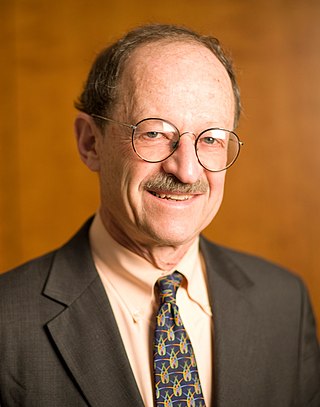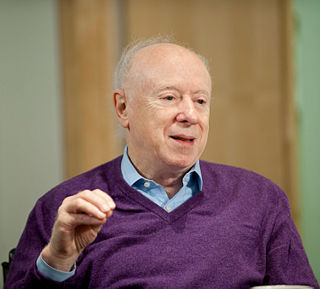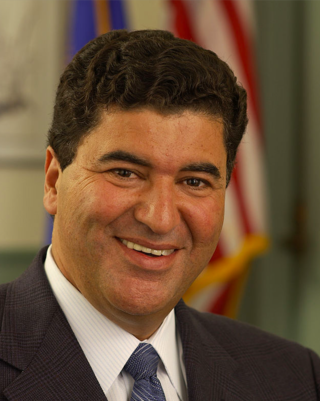Related Research Articles

Harold Eliot Varmus is an American Nobel Prize-winning scientist. He is currently the Lewis Thomas University Professor of Medicine at Weill Cornell Medicine and a senior associate at the New York Genome Center.

Joseph Leonard Goldstein ForMemRS is an American biochemist. He received the Nobel Prize in Physiology or Medicine in 1985, along with fellow University of Texas Southwestern researcher, Michael Brown, for their studies regarding cholesterol. They discovered that human cells have low-density lipoprotein (LDL) receptors that remove cholesterol from the blood and that when LDL receptors are not present in sufficient numbers, individuals develop hypercholesterolemia and become at risk for cholesterol related diseases, notably coronary heart disease. Their studies led to the development of statin drugs.

Elias Zerhouni is an Algerian-born American scientist, radiologist and biomedical engineer.

Robert Samuel Langer Jr. FREng is an American biotechnologist, businessman, chemical engineer, chemist, and inventor. He is one of the nine Institute Professors at the Massachusetts Institute of Technology.

Peter Walter is a German-American molecular biologist and biochemist. He is currently the Director of the Bay Area Institute of Science at Altos Labs and an emeritus professor at the Department of Biochemistry and Biophysics of the University of California, San Francisco (UCSF). He was a Howard Hughes Medical Institute (HHMI) Investigator until 2022.

Sree Chitra Tirunal Institute for Medical Sciences and Technology (SCTIMST), formerly Sree Chitra Tirunal Medical Center, is an Institution of National Importance in India established in 1976 at Thiruvananthapuram, Kerala. The institute is a statutory body under Ministry of Science and Technology under the administrative control of the Department of Science and Technology, Government of India. SCTIMST is one of the most prominent research institutes and centers in India.
Vamsi K. Mootha is an Indian-born American physician–scientist and computational biologist. He is an Investigator of the Howard Hughes Medical Institute, Professor of Systems Biology and Medicine at Harvard Medical School, Investigator in the Department of Molecular Biology at Massachusetts General Hospital. He is also an Institute Member of the Broad Institute.

Osamu Hayaishi MJA, was a Japanese biochemist, physiologist, and military physician. He discovered Oxygenases at the National Institute of Arthritis and Metabolic Diseases, National Institutes of Health in 1955.

Maria C. Freire is a Peruvian-American biophysicist who was the president and executive director of the Foundation for the National Institutes of Health (FNIH) from 2012-2021. She also is a member of the U.S. National Academy of Medicine and Council on Foreign Relations. Freire works in global health, technology commercialization and intellectual property management, focusing on the discovery, development and access to medical interventions.

Francis Sellers Collins is an American physician-scientist who discovered the genes associated with a number of diseases and led the Human Genome Project. He served as director of the National Institutes of Health (NIH) in Bethesda, Maryland, from 17 August 2009 to 19 December 2021, serving under three presidents.

Brian J. Druker, M.D. is a physician-scientist at Oregon Health & Science University (OHSU), in Portland, Oregon. He is the chief executive officer of OHSU's Knight Cancer Institute, JELD-WEN Chair of Leukemia Research, Associate Dean for Oncology in the OHSU School of Medicine, and professor of medicine.

Aviv Regev is a computational biologist and systems biologist and Executive Vice President and Head of Genentech Research and Early Development in Genentech/Roche. She is a core member at the Broad Institute of MIT and Harvard and professor at the Department of Biology of the Massachusetts Institute of Technology. Regev is a pioneer of single cell genomics and of computational and systems biology of gene regulatory circuits. She founded and leads the Human Cell Atlas project, together with Sarah Teichmann.
Zhijian "James" Chen is a Chinese-American biochemist and professor in the department of molecular biology at University of Texas Southwestern Medical Center. He is best known for his discovery of mechanisms by which nucleic acids trigger innate and autoimmune responses from the interior of a cell, work for which he received the 2019 Breakthrough Prize in Life Sciences.

Karl Alexander Deisseroth is an American scientist. He is the D.H. Chen Foundation Professor of Bioengineering and of psychiatry and behavioral sciences at Stanford University.

Lynne Elizabeth Maquat is an American biochemist and molecular biologist whose research focuses on the cellular mechanisms of human disease. She is an elected member of the American Academy of Arts and Sciences, the National Academy of Sciences and the National Academy of Medicine. She currently holds the J. Lowell Orbison Endowed Chair and is a professor of biochemistry and biophysics, pediatrics and of oncology at the University of Rochester Medical Center. Professor Maquat is also Founding Director of the Center for RNA Biology and Founding Chair of Graduate Women in Science at the University of Rochester.

The Foundation for the National Institutes of Health (FNIH) is a not-for-profit, 501(c)(3) charitable organization established by the US Congress in 1990. Located in North Bethesda, MD, the FNIH raises private-sector funds, and creates and manages alliances with public and private institutions in support of the mission of the National Institutes of Health (NIH).
Anne Brunet is a French geneticist who is the Michele and Timothy Barakett Endowed Professor and the co-director of the Paul F. Glenn Laboratories for the Biology of Aging at Stanford University School of Medicine. Her lab studies mechanisms of aging and longevity.
Jeannie T. Lee is a Professor of Genetics at Harvard Medical School and the Massachusetts General Hospital, and a Howard Hughes Medical Institute Investigator. She is known for her work on X-chromosome inactivation and for discovering the functions of a new class of epigenetic regulators known as long noncoding RNAs (lncRNAs), including Xist and Tsix.

'Yasmine Belkaid; born August 1968) is an immunologist, currently President of the Institut Pasteur. She has Algerian citizenship by her father and French citizenship by her mother, and she also holds US citizenship.
Clifford P. Brangwynne is a professor of chemical and biological engineering at Princeton University, the director of the Princeton Bioengineering Initiative, and the June K. Wu ’92 Professor in Engineering. He is also a researcher at the Howard Hughes Medical Institute.
References
- ↑ "LURIE PRIZE OVERVIEW". Foundation for the National Institutes of Health. Archived from the original on 1 September 2015. Retrieved 14 August 2015.
- ↑ Lurie Prize in Biomedical Sciences 2023